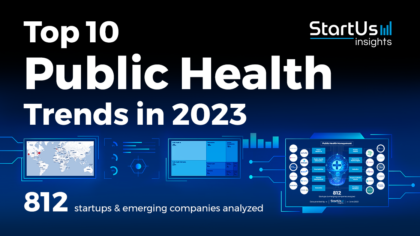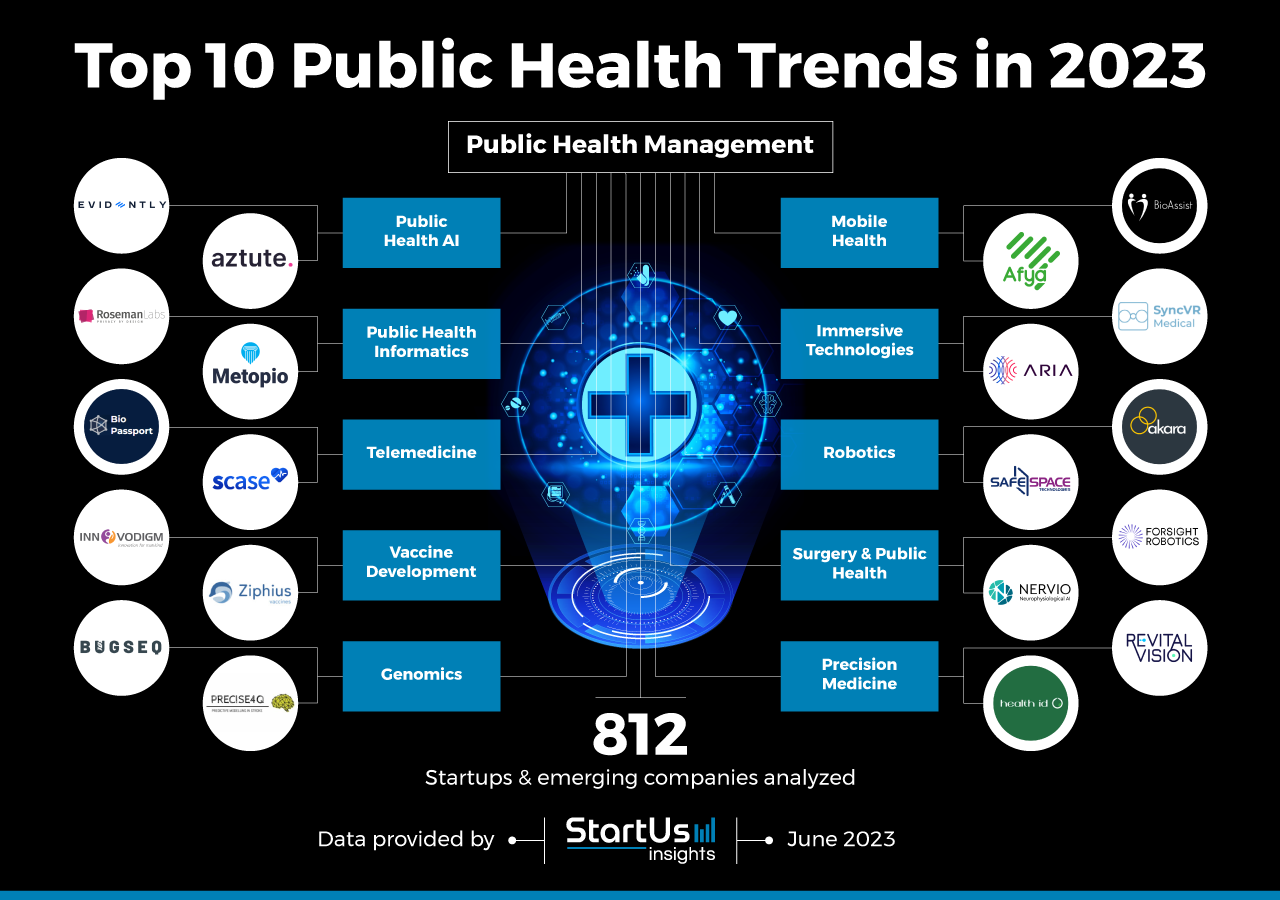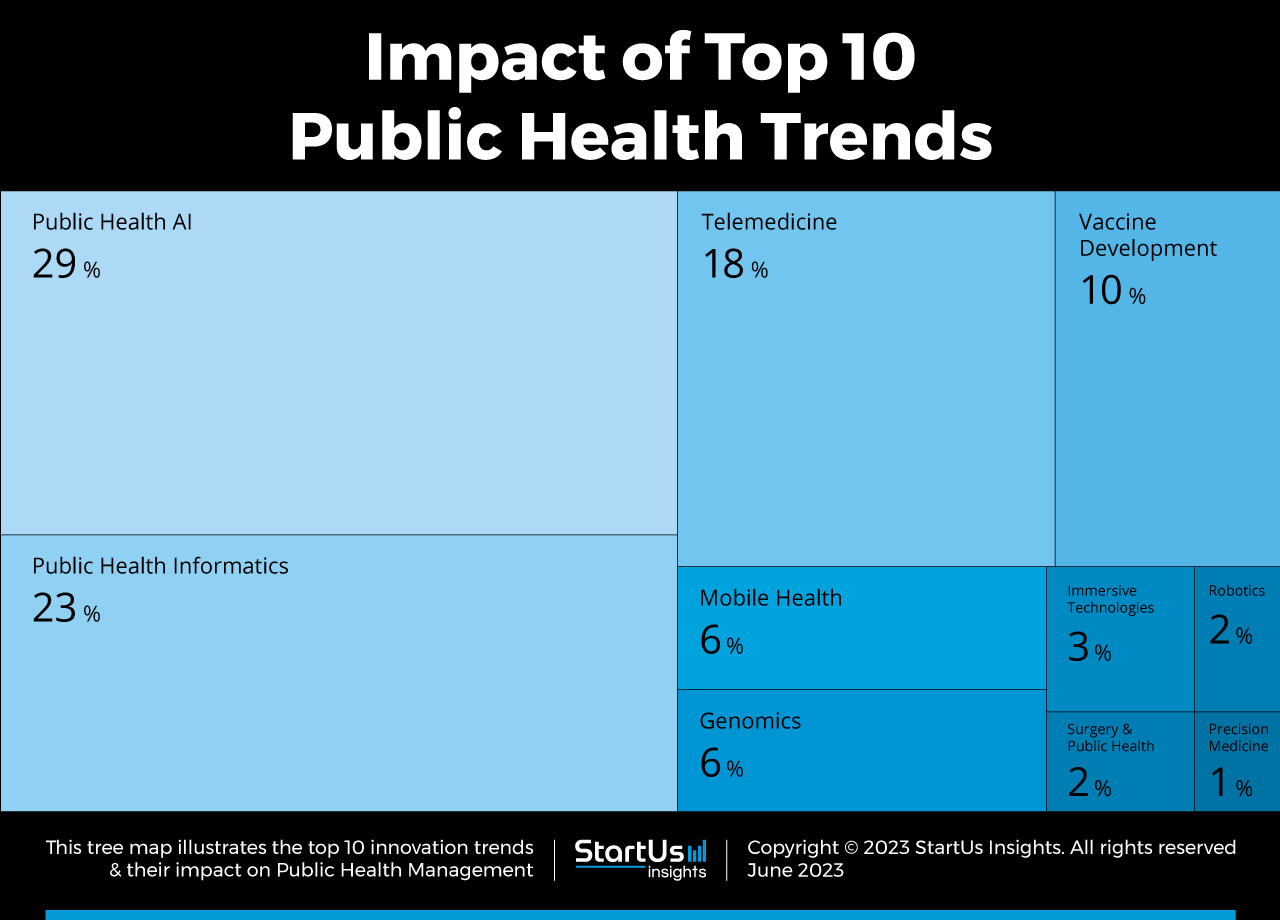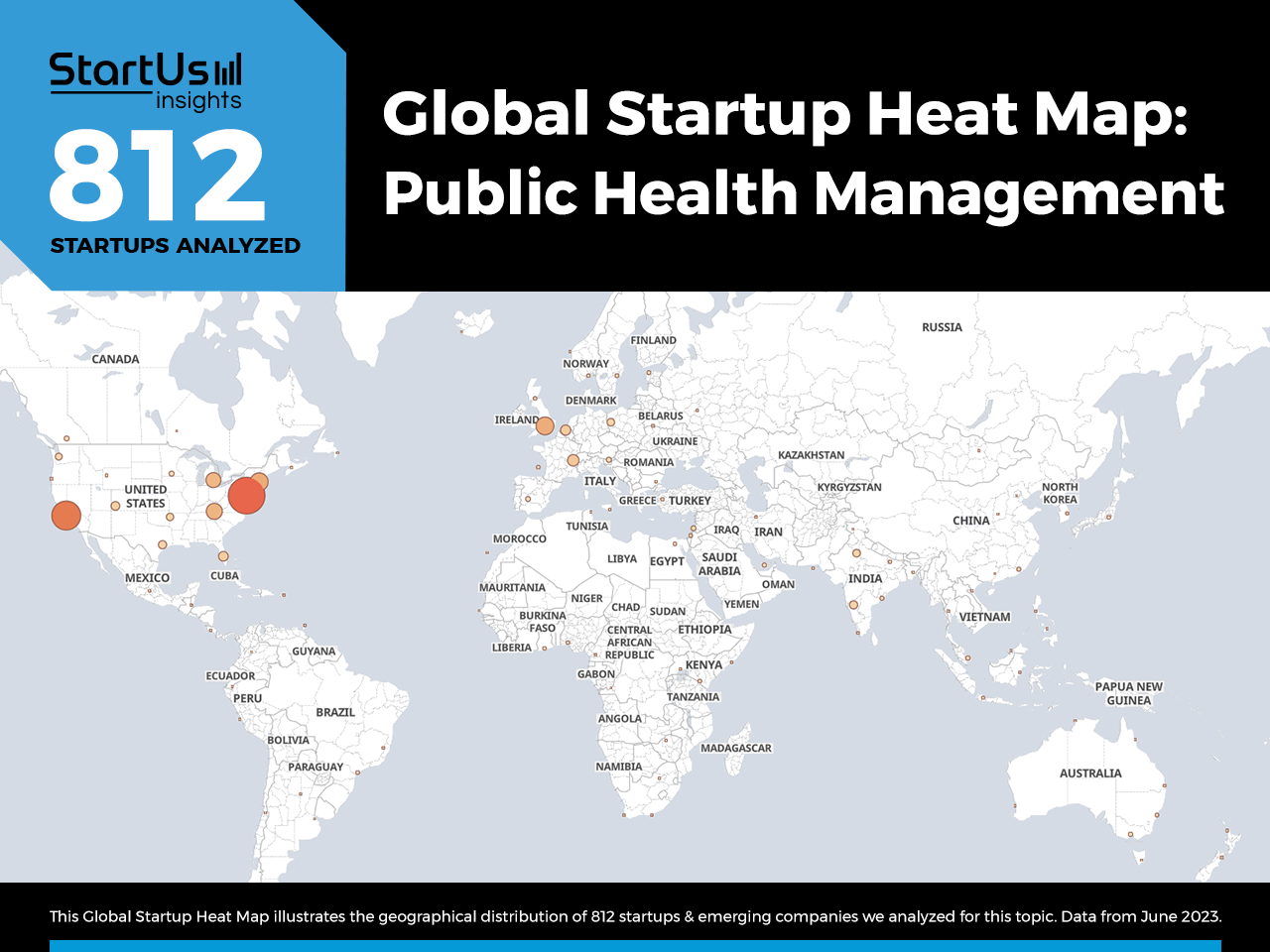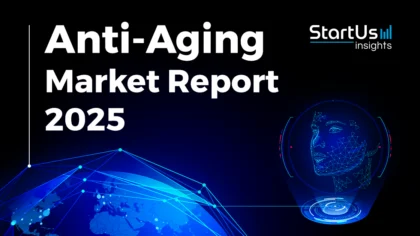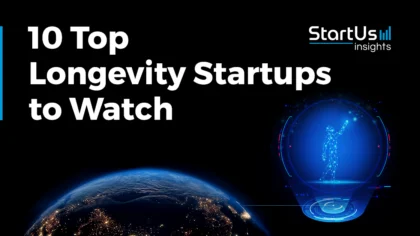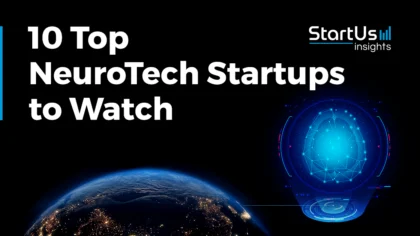Accelerate Productivity in 2025
Reignite Growth Despite the Global Slowdown
Public health management plays a vital role in safeguarding the well-being of communities and populations. By implementing effective strategies and interventions, public health professionals prevent diseases and enhance the overall quality of life. Fortunately, advances in technology pave the way for solutions that address public health challenges. This research focuses on the top 10 public health trends in 2024 based on our analysis of 812 emerging companies. The top trends in public health management (PHM) include artificial intelligence (AI), telemedicine, vaccine development, and more. Read more to explore how each trend impacts care delivery.
Innovation Map outlines the Top 10 Emerging Trends in Public Health & 812 Promising Startups
For this in-depth research on the Top Public Health Trends & Startups, we analyzed a sample of 812 global startups & scaleups. This data-driven research provides innovation intelligence that helps you improve strategic decision-making by giving you an overview of emerging technologies in the healthcare industry. In the Public Health Innovation Map, you get a comprehensive overview of the innovation trends & startups that impact your company.
These insights are derived by working with our Big Data & Artificial Intelligence-powered StartUs Insights Discovery Platform, covering 3 790 000+ startups & scaleups globally. As the world’s largest resource for data on emerging companies, the SaaS platform enables you to identify relevant technologies and industry trends quickly & exhaustively.
Tree Map reveals the Impact of the Top 10 Trends in Public Health
Based on the Public Health Innovation Map, the Tree Map below illustrates the impact of the Top Public Health Trends in 2024. AI in public health transforms disease detection, risk assessment, and decision-making while health informatics employs data analytics for efficient health data handling. Telemedicine improves healthcare accessibility and timeliness. The industry is also focusing on vaccine development for new diseases and fortifying immunization efforts.
Further, genomics and personalized medicine promote individualized health interventions, enhancing disease prevention, diagnosis, and treatment. Mobile health allows people to control their health via mobile apps and devices. Immersive Technologies, like virtual and augmented reality (VR/AR), improve healthcare training, patient education, and therapies. Robotics further enhances surgical procedures and automates healthcare processes for improved outcomes. Surgery and public health innovations bolster surgical outcomes and public health. Lastly, precision medicine customizes treatments to optimize effectiveness and minimize adverse effects.
Top 10 Future Trends in Public Health (2024)
- Public Health AI
- Public Health Informatics
- Telemedicine
- Vaccine Development
- Genomics
- Mobile Health
- Immersive Technologies
- Robotics
- Surgery & Public Health
- Precision Medicine
Global Startup Heat Map covers 812 Public Health Startups & Scaleups
The Global Startup Heat Map below highlights the global distribution of the 812 exemplary startups & scaleups that we analyzed for this research. Created through the StartUs Insights Discovery Platform, the Heat Map reveals high startup activity in the US, followed by the UK and India. Below, you get to meet 20 out of these 812 promising startups & scaleups as well as the solutions they develop. These public health startups are hand-picked based on criteria such as founding year, location, funding raised, & more. Depending on your specific needs, your top picks might look entirely different.
Top 10 Current Trends in Public Health (2024)
1. Public Health AI
Public health AI is transforming public health management in several significant ways. The healthcare industry leverages AI to predict disease outbreaks, optimize resource allocation, and personalize patient care. For example, machine learning algorithms analyze vast health data to identify patterns and trends. Predictive analytics also enables them to take proactive measures and mitigate potential health crises. AI-powered telemedicine platforms offer remote consultations and ensure healthcare accessibility. Natural language processing (NLP) further helps in analyzing public sentiment and guiding health policies. AI’s role in public health extends to drug discovery, accelerating the development of novel treatments.
Evidently provides a Platform to Automate Medical Tasks
US-based startup Evidently creates a cognitive AI platform to streamline public health management by automating tasks involving clinical data. It optimizes health outcomes, revenue cycles, and clinical research, contributing to the overall improvement of population health. Utilizing machine reading and knowledge graph technologies, the startup enhances public health management efficiency. Its companion app integrates into electronic health record (EHR) systems to provide a comprehensive summary of patient data and clinical knowledge. This seamless integration expedites deployment and promotes health outcomes at a population level.
Aztute offers an AI-based Digital Health Platform
Aztute is a Canadian startup that provides a comprehensive digital health platform to enhance public health outcomes and community engagement. The platform, built on Microsoft Cloud, offers AI-driven insights, evidence-based education, and consumer collaboration. Core components of the platform include efficient data collection, two-way community communication, and secure document sharing. It also features a workflow solution that automates processes and data collection for public health organizations. Additionally, the platform offers a population health management dashboard for comprehensive data analytics and visualization, improving community health assessments.
2. Public Health Informatics
Public health informatics, a fundamental element of PHM, utilizes data to enhance health outcomes based on data-driven actionable insights. Professionals in public health management utilize data analytics to track disease spread and enable timely interventions. Predictive modeling helps anticipate health crises, facilitating proactive measures. Digital health records streamline patient care and ensure seamless information flow. Further, geographic information systems (GIS) map disease hotspots to guide resource allocation. Health informatics provides evidence-based inputs for decision-making and thus aids in policy formulation.
Roseman Labs ensures Secure Medical Data Collaboration
Roseman Labs offers a virtual data lake for secure data collaboration in healthcare. This tool allows health organizations to join their data virtually, without exposing sensitive patient information. The platform also ensures strict purpose binding, providing control for all parties involved. It enables organizations to perform analyses on joint data while maintaining strong privacy. This approach accelerates the generation of insights, contributing to the advancement of public health systems.
Metopio streamlines Public Health Data Management
US startup Metopio offers a public health platform to streamline data management and enhance public health informatics. It provides a single, tested interface for accessing curated data, expediting data requests, and improving workflow efficiency. Metopio’s dynamic data hub breaks down data silos, offering a comprehensive data picture. This reduces risk, increases productivity, and empowers community partners to better understand and act on community health insights.
3. Telemedicine
Telemedicine bridges geographical gaps in healthcare access by delivering remote consultations, diagnostics, and treatments. Such solutions employ video conferencing for real-time patient-doctor interactions for ensuring timely care. AI-powered chatbots further deliver preliminary health advice and direct patients to appropriate care. Remote patient monitoring tools track health parameters, alerting healthcare providers of any anomalies. Telemedicine also facilitates mental health support by offering therapy sessions online. Digital health records, integral to telemedicine, enable seamless information exchange.
Bio Passport develops a Digital Disease Tracking Tool
Bio Passport is a Ghana-based startup that makes a healthcare application to address public health challenges. It targets high-risk individuals, such as those with chronic diseases or the elderly. Bio Passport’s solution helps mitigate the risks associated with high-risk infections that occur every 4-5 years. Its companion app serves as a digital tool for health monitoring and risk assessment. This allows healthcare centers to better manage public health, particularly in the context of recurring high-risk viruses.
Scase makes an Intelligent Portable Patient Database
Slovakian startup Scase offers a portable, point-of-care (PoC) medical device that combines smart sensors with a digital patient database. It connects to a digital platform and enables two-way communication and visualization of patient vital data. Its Scase Software Platform features data visualization, communication tools, personalized measurement management, and administrative automation. This solution is particularly useful in the context of public health, providing quick diagnostics and facilitating telemonitoring of patients with chronic diseases. Scase’s technology is compact and user-friendly, making patient data more accessible and enhancing public health management.
4. Vaccine Development
Novel public health management companies use innovative technologies to expedite vaccine creation. They employ AI for predictive modeling, identifying potential vaccine candidates. Additionally, genomic sequencing aids in understanding pathogens and guiding vaccine design. Synthetic biology enables the creation of novel vaccine platforms, such as mRNA vaccines. Emerging companies also leverage data analytics for vaccine trials, ensuring safety and efficacy. The industry is also working on post-vaccine deployment, digital tools to track vaccine distribution and uptake, and informing public health strategies. Immunization also encompasses pandemic preparedness, equipping societies to combat future health threats.
Innovodigm enables Micro-needle based Vaccine Delivery
Indian startup Innovodigm develops a microneedle-based platform technology for transdermal vaccine and biologics delivery. The startup’s product, Theroptach, is a thermostable, painless vaccine delivery patch. It makes vaccines more accessible, especially in remote areas with limited infrastructure and healthcare professionals. This product also addresses the issue of vaccine wastage due to multidose vials. Innovodigm focuses on the easy availability and equitable distribution of point-of-care diagnosis and drug delivery.
Ziphius Vaccines makes RNA Platforms for Vaccines
Belgian startup Ziphius Vaccines is a biotech startup that develops self-amplifying RNA-based platforms for prophylactic vaccines. These vaccines are for infectious diseases and therapeutics for rare genetic disorders. The company’s technology includes messenger RNA (mRNA) and self-amplifying RNA (saRNA) – both support encoding a broad spectrum of disease-specific antigens or proteins. The self-amplifying RNA platform allows for rapid and scalable manufacturing of innovative medical tools. The startup’s pipeline includes vaccines for the prevention of infectious diseases and gene supplementation therapies for rare genetic disorders. Ziphius Vaccines’ technology significantly contributes to disease prevention and management, addressing public health needs on a global scale.
5. Genomics
Public health centers leverage genomics to understand disease susceptibility and guide preventive strategies. They utilize next-generation sequencing technologies for rapid, accurate genetic analysis. Bioinformatics tools also transform genomic data into actionable health insights. Genomics aids in pathogen identification, crucial for infectious disease control. Further, personalized medicine powered by genomics tailors treatments to individual genetic profiles. Genomic epidemiology also tracks disease spread, informing public health interventions.
BugSeq offers an Automated Bioinformatics Platform
Canadian startup BugSeq provides an automated bioinformatics platform for microbiology labs to enhance DNA sequencing adoption, leverage, and scalability. The platform supports various experimental designs, including metagenomic sequencing, whole genome sequencing (WGS), viral amplicons, and 16S/ITS sequencing. BugSeq’s cloud-based infrastructure ensures rapid analysis for workloads of any size while maintaining data security. The platform is cost-effective and reduces bioinformatics and IT costs. From a public health perspective, BugSeq’s technology aids in tracking pathogen spread and helps in identifying antimicrobial susceptibilities and detecting contaminating microbes in food safety.
PRECISE4Q advances Genomic Data Analysis
German startup PRECISE4Q leverages genomic data analysis to enhance stroke management, a major health concern with significant individual and societal implications. The startup utilizes multi-dimensional, data-driven predictive simulation models, thus integrating genomic data to enable personalized stroke treatment. This approach addresses the patient journey through four stages – prevention, acute treatment, rehabilitation, and reintegration. PRECISE4Q’s solution advances precision medicine by integrating genomic data in predictive analytics and thereby improving patient outcomes.

6. Mobile Health
mHealth leverages mobile technologies to deliver health services and information. It powers apps for remote consultations, health tracking, and medication reminders. AI-powered chatbots provide instant health advice, directing users to appropriate care. Wearable devices further monitor vital signs and alert healthcare providers of any anomalies. mHealth platforms facilitate health education and promote preventive care. Digital health records, integral to mHealth, ensure seamless information exchange and thus aids in disease surveillance and tracking health trends.
BioAssist enables App-based Remote Patient Monitoring
Portuguese startup BioAssist develops a platform that provides advanced healthcare services online and simplifies remote patient monitoring. It supports video calls, chat messaging, and health monitoring using biosignal sensors and medical devices. The app also includes reminder services for care plan fulfillment and lifestyle improvement. It creates a complete personal health record, organizing and presenting measurements, notes, consultations, medication, and other health records in a timeline view. This enhances public health management by facilitating remote patient care and comprehensive health record maintenance.
Mobile Afya enables Public Health Data Access
Mobile Afya is a Tanzanian startup that creates an offline mobile application for public health management. It utilizes Unstructured Supplementary Service Data (USSD) to provide basic health information and education in local languages. The app allows patients to call doctors and seek health consultations through feature phones and smartphones. Users dial an access code, choose a service or topic, and receive a text message with the requested information. This is particularly beneficial for public health in rural areas, ensuring health information is accessible to all, regardless of internet connectivity.
7. Immersive Technologies
Immersive technologies, encompassing VR and AR, are reshaping the PHM landscape by delivering immersive therapies for patients and training for healthcare professionals. AR assists in complex surgeries by providing real-time, 3D visualizations. Immersive technologies also offer therapeutic applications, aiding in pain management and mental health treatment. VR simulations facilitate public health education, creating engaging, interactive experiences. AR apps further guide patients in performing health checks and promoting self-care.
SyncVR develops an Extended Reality (XR) Platform for Physicians
Dutch startup SyncVR Medical offers an all-in-one XR platform for healthcare and education to improve healthcare outcomes. It provides a library of medical XR software applications, including applications to decrease pain, anxiety, and medication. The platform trains medical professionals through XR training simulations. SyncVR Medical also provides healthcare-approved XR hardware, CE-certified software, workshops, and research collaborations. The platform integrates with EHRs, ensuring seamless data management. SyncVR’s technology enhances public health care, reduces healthcare costs, and improves the training of healthcare professionals.
Aria Research offers a Bioinic Device for the Blind
Australian startup Aria Research develops a bionic device that uses technologically-enhanced human echolocation to help blind or low-vision individuals perceive their surroundings. The device provides an immersive and detailed real-time perception of the immediate environment, enhancing the user’s autonomy and agency. Aria’s technology is lightweight, offers vision through sound, and has an all-day battery life. From a public health perspective, this technology significantly improves the quality of life for individuals with visual impairments.
8. Robotics
Robots assist in surgeries by ensuring accuracy and minimizing invasiveness. They aid in patient care from medication dispensing to mobility support. Robotics also contributes to laboratory automation, speeding up diagnostic processes. Telepresence robots enable remote consultations, thereby bridging geographical gaps in healthcare access. Robots even assist in disinfection procedures and maintaining hygiene in healthcare settings. The application extends to rehabilitation with robotic aids supporting physical therapy.
Akara provides a Real-time Infection Control System
Irish startup Akara is a healthcare innovation company that focuses on infection control in hospitals. Its technology-enhanced infection control service combines AI and robotic automation. The startup digitizes cleaning workflows, deploys robots for disinfection, and uses sensors to monitor room conditions. It also provides real-time data on room cleanliness and availability as well as enables direct communication with the cleaning staff. This allows health centers and public venues to significantly improve property hygiene, reduce infection rates, and enhance public safety.
Safe Space Technologies makes Disinfection Robots
US-based startup Safe Space Technologies creates intelligent disinfection solutions using the disinfection properties of UV-C light. The startup’s RoverUV Mobile Disinfection Robot, C4UV Disinfection Cart, and Novair Air Sterilizers reduce time, labor, and the use of harsh chemicals in disinfection processes. The UV-C technology used is naturally effective, rendering bacteria, viruses, and protozoa incapable of reproducing and infecting when exposed to the germicidal UV-C wavelength. From a public health perspective, Safe Space Technologies’ solutions significantly improve hygiene in various settings, including schools, universities, retail spaces, and commercial properties.
9. Surgery & Public Health
Surgery is a vital component of PHM and directly impacts patient outcomes. Startups are innovating in this field with cutting-edge technologies. They employ robotic systems for precision in complex procedures. Minimally invasive techniques are used, reducing recovery times and enhancing patient comfort. AI assists in preoperative planning and predicting surgical outcomes. Tele-surgery, enabled by high-speed networks, also allows expert surgeons to operate remotely. Startups also use virtual reality for surgical training, enhancing skill acquisition.
Forsight Robotics designs an Ophthalmic Surgery Platform
Ethiopian startup Forsight Robotics develops ORYOM, a hybrid intraocular robotic ophthalmic platform. It leverages high-precision robotics, advanced visualization, and cognitive data analytics to provide consistent, reliable ophthalmic surgical procedures. ORYOM performs curative and preventative ophthalmic surgeries, including treatments for retinal diseases, cataracts, and glaucoma. The platform also addresses the shortage of trained surgeons and the high demand for surgical eye care. Forsight Robotics’ technology improves global public health access to surgical eye care and helps prevent avoidable blindness.
Nervio develops AI for Autonomous Neuromonitoring
Israeli startup Nervio develops autonomous neuromonitoring AI technology to prevent paralysis during surgical procedures. The AI-powered solution allows a single neurophysiologist to monitor multiple surgeries simultaneously, converting raw surgical data into real-time alerts and recommendations. It is built on advanced machine learning algorithms and clinical intelligence, providing a new standard of care in neurosurgery. Nervio’s solution addresses the significant shortage of expert neurophysiologists, making neuromonitoring more accessible and affordable. This technology supports public health applications and reduces the risk of paralysis, and severe neurological complications during surgery.
10. Precision Medicine
Personalized medicine tailors treatments to individual patient profiles using genomics and AI. Genomic sequencing identifies individual genetic variations, guiding treatment choices. AI, in combination with bioinformatics, analyzes patient data, predicts treatment responses, and converts genomic data into actionable health insights. Precision medicine also includes pharmacogenomics, adjusting drug therapies based on genetic makeup. Personalized health monitoring devices track patient responses, informing treatment adjustments. This also includes preventive care with genetic risk assessments to enable early interventions.
RevitalVision improves Neural-Vision
RevitalVision is an Israeli startup that develops vision improvement technology. The startup’s program does not require surgery or prescriptive medication, and it improves vision by more than two lines on the eye chart and 100% in contrast sensitivity. The technology works by enhancing neural-vision skills with the effects being long-lasting, similar to learning to walk or ride a bicycle. The program is safe, with no known risks, side effects, or complications associated with it. RevitalVision’s technology significantly improves the quality of public health for individuals with vision impairments while eliminating invasive procedures or medications.
Clic Health ID builds a Sample Collection Device
Brazilian startup Clic Health ID provides health and wellness solutions, including laboratory tests, technologies, and alternative means of collection. The startup’s Health ID PSD is a device for capillary blood collection, clinically validated with rigorous standards of accuracy and reliability. It allows for blood collection anywhere, making it minimally invasive and simplified as well as ideal for large populations and remote regions. Health ID PSD does not require special storage conditions and the sample remains stable for up to 14 days. Clic Health ID’s technology makes blood collection more accessible and efficient, improving the delivery of public health services.
Discover all Public Health Trends, Technologies & Startups
The integration of genomics, mobile health, and robotics have already improved healthcare accessibility, patient outcomes, and surgical procedures. Public health informatics further enables efficient data collection and analysis, empowering decision-making processes. Immersive technologies and vaccine development continue to drive advancements in healthcare training and immunization programs. The Public Health Trends & Startups outlined in this report only scratch the surface of trends that we identified during our data-driven innovation & startup scouting process. Identifying new opportunities & emerging technologies to implement into your business goes a long way in gaining a competitive advantage.
